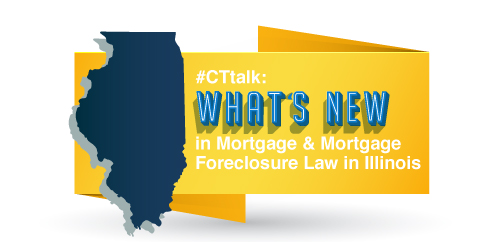By Douglas M. Karlen
Vice President and Regional Counsel
Chicago Title Insurance Company
DOWNLOAD THE ARTICLE HERE.
Several new laws affecting mortgages and mortgage foreclosures recently became effective. This article will describe these new laws.
Mortgage Originators
Public Act 99-113 (HB 2814), effective July 23, 2015, amends Section 1-3 of the Residential Mortgage License Act of 1987, 205 ILCS 635/1-3, to counteract the holding in a recent Illinois appellate court case. See First Mtg. Co. v. Dina, 2014 IL App. (2d) 130567 (a mortgage is void ab initio if originated by an unlicensed lender and any judgment of foreclosure based on such a mortgage is also void).
Section 1-3, entitled Necessity for License, is amended at paragraph (e) to state:
A mortgage loan brokered, funded, originated, serviced, or purchased by a party who is not licensed under this Section shall not be held to be invalid solely on the basis of a violation under this Section.
The amendment goes on to state that this enactment is declarative of existing law—the usual remark when the legislature seeks to upend a judicial ruling.
COMMENT
The amendment effectively eliminates one defense to a mortgage foreclosure proceeding. See also LVNV Funding, LLC v. Trice, 2015 IL 116129 (a judgment is not void if the court that entered the judgment had both personal and subject matter jurisdiction).
Deceased Mortgagors
In a mortgage foreclosure proceeding, case law, court rule, and statute now require the appointment of a special representative for a deceased mortgagor in order to vest subject matter jurisdiction in the trial court. See ABN AMRO Mtg. Group, Inc. v. McGahan, 237 Ill.2d 526 (2010); Ill. S. Ct. Rule 113(i) (referencing 735 ILCS 5/13-209); and Section 15-1501(h) of the Illinois Mortgage Foreclosure Law, 735 ILCS 5/15-1501(h). Public Act 99-24 (SB 735), effective January 1, 2016, amends Section 15-1501(h) to clarify when a special representative need not be appointed. As amended, paragraph (h) states that the court is not required to appoint a special representative for a deceased mortgagor if there is a:
- Living person, persons, or entity holding a 100% interest in the property as the deceased mortgagor’s surviving joint tenant or surviving tenant by the entirety;
- Beneficiary under a transfer on death instrument (TODI) executed by the mortgagor and recorded prior to the mortgagor’s death;
- Person, persons, or entity who acquired title through a conveyance of the property from the mortgagor prior to the mortgagor’s death;
- Person, persons, or entity who acquired title through a conveyance of the property from the administrator or executor of the mortgagor’s probate estate; or
- Trust that acquired title through a conveyance of the property from the mortgagor or from any other person, persons, or entities identified above.
COMMENT
These exemptions from the requirement of a special representative make perfect sense and comport with pre-amendment title practice. If, for example, Chicago Title was able to make a title finding subsequent to the death of a title holder, e.g., through joint tenancy, tenancy by the entireties, TODI, probate, valid conveyance, etc., it would not call for the appointment of a special representative. Title practice will continue in this vein. Lenders should reserve the special representative procedure for cases in which the above exemptions do not apply and in which the heirs or devisees of a deceased title holder cannot be determined from public records or other information in the lender’s possession.
The list of exemptions does not include a person or persons who acquire title to the property through intestate succession outside a probated estate. It is possible, however, that the court will not require appointment of a special representative if the lender can definitively point to title holders of a 100% interest based on affidavits of heirship or other reliable information.
Some of the language of this amendment seems out of place. For example, an “entity” cannot be a surviving joint tenant or surviving tenant by the entirety. Similarly, there cannot be “persons” as a surviving tenant by the entirety. No doubt the courts will ignore these minor language quirks.
Reverse Mortgages
Public Act 99-331 (SB 1440), effective January 1, 2016, creates the Reverse Mortgage Act, to be codified as 765 ILCS 945/1 et seq. The Act imposes a regulatory scheme (including required disclosures to borrowers) on parties making reverse mortgage loans in Illinois.
The Act defines a reverse mortgage as a non-recourse loan, secured by real property or a homestead property, that:
- Provides cash advances to a borrower for the purchase of the home or based on the equity in a borrower’s owner-occupied principal residence, provided it is a residence with not more than 4 units, and
- Requires no payment of principal or interest until the entire loan becomes due and payable.
See 765 ILCS 945/5.
Homestead property is defined as the domicile and contiguous real estate owned and occupied by the borrower. Both “homestead” and “real property” include manufactured housing units deemed real property under the Conveyance and Encumbrance of Manufactured Homes as Real Property and Severance Act, 765 ILCS 170/5-35.
Reverse mortgages shall be subject to the following provisions:
- Payment, in full or in part, shall be permitted at any time during the term of the reverse mortgage loan;
- Interest rates may be fixed, variable, or contingent on appreciated value;
- Periodic advances may not be reduced in amount or number in the event of fluctuations in interest rates; and
- The lender may impose any terms and conditions required by federal laws or regulations
See 765 ILCS 945/10(a).
Further, the repayment obligation under a reverse mortgage is subject to the following provisions:
- Temporary absences from the home not exceeding 60 consecutive days shall not cause the mortgage to become due and payable; and
- Temporary absences from the home exceeding 60 days, but not exceeding one year, shall not cause the mortgage to become due and payable, provided the borrower has secured the property to the lender’s satisfaction.
See 765 ILCS 945/10(b).
Finally, a reverse mortgage shall become due and payable upon the occurrence of any of the following, unless the maturity date has been extended under federal guidelines:
- The property securing the loan is sold;
- All borrowers cease to occupy the property as a principal residence;
- An agreed maturity date is reached;
- Borrower defaults on any obligation in the loan agreement; or
- The borrower dies; or, if the property is in joint tenancy, the last surviving joint tenant, who held an interest when the mortgage was recorded, dies.
See 765 ILCS 945/10(c).
In addition, the Act requires three sets of disclosures to a reverse mortgage borrower prior to closing. See 765 ILCS 945/15. First, the Attorney General is charged with the task of developing an educational pamphlet containing “independent consumer information on reverse mortgages,” potential alternatives, and the availability of independent counselling services. The lender must furnish a copy of this pamphlet to the borrower at the time of the loan application or shortly thereafter.
Second, the lender shall furnish to borrower, at the time of the loan application or shortly thereafter, a notice regarding counseling, as required by federal guidelines. The notice must contain a statement set out at 765 ILCS 945/15(b).
Third, the Act requires a “cooling-off period.” A borrower shall not be bound for 3 full business days after the borrower’s acceptance, in writing, of a lender’s written commitment to make a reverse mortgage loan. The closing on the reverse mortgage cannot occur during the cooling-off period, and the borrower cannot waive the cooling-off period. At the time of making the commitment, the lender must deliver to the borrower a notice describing the cooling-off period. The notice must contain language set out at 765 ILCS 945/20(c).
Section 25 of the Act prohibits lenders from tying reverse mortgage loans to other, non-mortgage products, such as annuities, investments, life insurance policies, or long-term care insurance policies. The Section prohibits various marketing, offering, or referring activities regarding these non-mortgage products. See 765 ILCS 945/25.
Section 30 of the Act prohibits disbursement of lender’s funds to anyone who, directly or indirectly, induced the borrower to seek a reverse mortgage for any purpose other than for bona fide origination fees. For example, if a home repair company refers a customer to the lender, loan proceeds may be paid directly to the home repair company for bona fide origination fees but not for the cost of home improvements. 765 ILCS 945/30.
Finally, no commitment for a reverse mortgage loan may be made unless all lenders involved in brokering and making the reverse mortgage loan certify that all of the requirements of Sections 10 through 30 (including all 3 notice provisions) have been satisfied. The lender is not required to deliver, or even show, the certificate to the borrower. Instead, the lender must retain the certificate on file through the term of the reverse mortgage loan. 765 ILCS 945/35.
Section 40 of the Act declares that a violation is deemed an unlawful practice under the Consumer Fraud and Deceptive Business Practices Act, 815 ILCS 505/1 et seq. It is unclear, however, whether consumers (the borrowers) will have a cause of action for civil damages if a lender violates the Reverse Mortgagee Act. The Act states that “[o]nly the Attorney General may enforce violations of this Act. 765 ILCS 945/40.
Conclusion
Practitioners who counsel lenders should review the full text of these new laws. To view these laws, visit the General Assembly’s website at www.ilga.gov.


